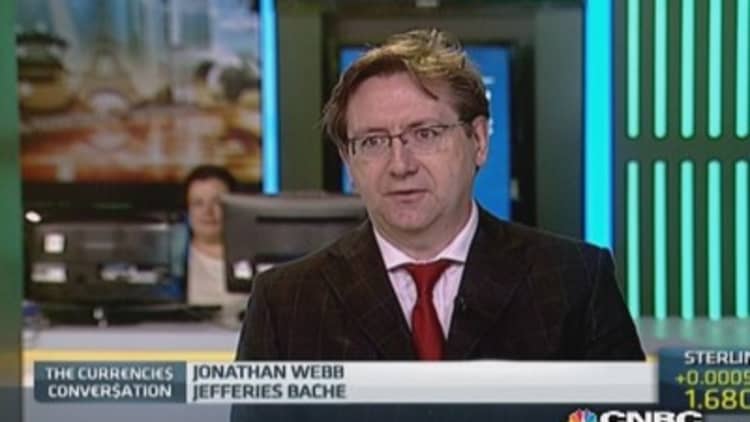The euro rose against the dollar and the yen on Monday, as speculators cut large bets against the single currency, confident the ECB will not be easing policy again soon.
Amid lower-than-usual volumes due to a holiday in some parts of Europe, the dollar gave up some gains made after upbeat U.S. jobs data on Friday. The reassuring data bolstered risk appetite and underpinned higher-yielding currencies like the and New Zealand dollars.
The euro rose 0.2 percent to $1.3667, pulling further away from a four-month low of $1.3503 hit on Thursday after the European Central Bank cut its main rates to record lows, imposed a negative rate on excess cash deposited with it and announced measures to pump money into the sluggish euro zone economy, as it seeks to ward off the risk of deflation.
But it stopped short of announcing outright purchases of sovereign bonds, or a large expansion of its balance sheet, factors that were likely to offer the euro support, for now.
"The ECB did not manage to increase expectations of additional policy action to be considered anytime soon," said Manuel Oliveri, currency analyst at Credit Agricole.
Read MoreFive years later, do we face a market "melt-up"?
He also cast doubt on whether the cut in deposit rates into negative territory was a game changer.
"It must be considered that a marginal deposit rate cut is unlikely enough to have a meaningful impact on the euro-related capital flow situation. This combined with speculative euro short positioning close to multi-month highs should keep the single currency subject to upside risks."
Traders said large option expiries between $1.35 and $1.37 would keep the euro in that range in the near term.

Other factors that have supported the euro this year also remain in place. The euro zone's trade surplus is keeping exporters' cash flowing back, European banks are repatriating capital home to meet capital requirements and investors are pushing more money into the peripheral bond markets.
"We would tactically go long euro/dollar looking for a move back to the top end of this year's range," said George Saravelos, currency strategist at Deutsche Bank, adding that the bar for sovereign bond purchases by the ECB was pretty high.
Dollar pauses
The dollar eased to 102.42 yen, having made gains on Friday, when data showed U.S. non-farm payrolls increased by 217,000 last month. The report offered confirmation that the world's largest economy has snapped back from a winter slump.
Despite the yen inching up against the dollar, further gains were unlikely, analysts said.
"Right now there is also less reason to buy the yen, with factors such as NISA, public pension funds and corporate M&A seen diminishing the currency's allure," said Bart Wakabayashi, head of forex at State Street in Tokyo.
Read MoreCentral banks, datato dominate week in Asia
Nippon Individual Savings Account (NISA) is a new tax-break facility for Japanese retail investors introduced in January and aimed at driving massive savings into stocks and mutual funds, some of which are expected to be invested in foreign assets.
Japan's public pension fund, the world's largest, has been working to diversify its domestic bond-centric portfolio and any changes are likely to have a significant effect on flows.
A recent increase in cross-border merger and acquisition activity by Japanese companies is another factor seen pressuring the yen by raising demand for foreign currencies.
Last week, Dai-ichi Life Insurance Co, Japan's second-largest private sector insurer, agreed to buy U.S. peer Protective Life for $5.7 billion.
There was little market reaction to a series of data out of Japan. First-quarter economic growth was revised up to 1.6 percent from a preliminary 1.5 percent and the country posted a current account surplus for a third straight month, albeit lower than expected, in April.

